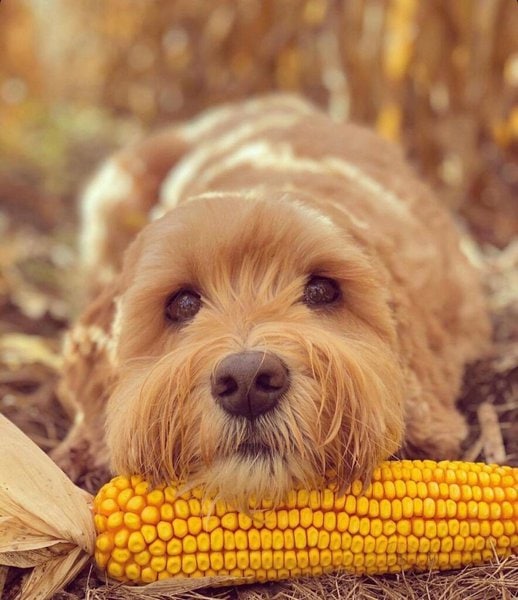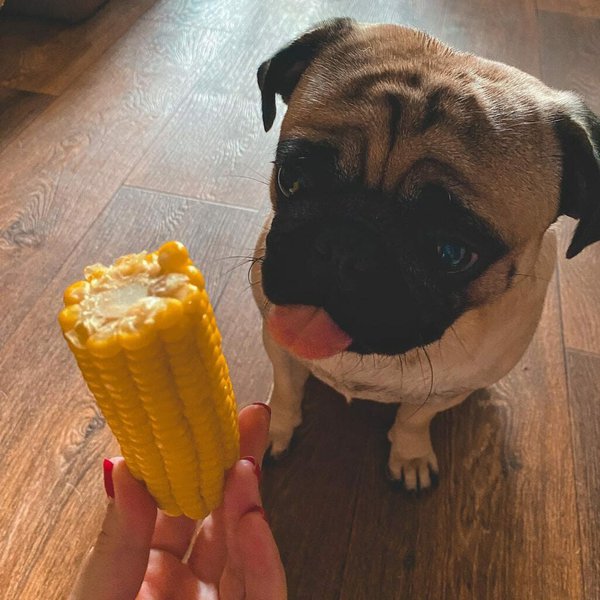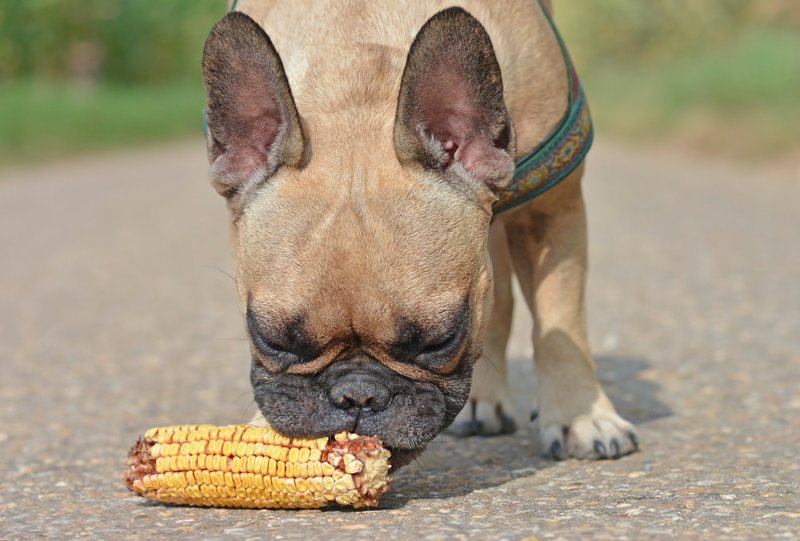One topic that has constantly raised debates in the dog world is the nutritional value of corn when it is fed to dogs, and whether corn is safe for dogs to consume.
So then, is corn safe for dogs to eat? Yes, corn is safe for dogs to eat, provided it is fed in moderate quantities, and separated from the cob before it is given to the pooch. Even better is the fact that corn contains a number of valuable nutrients, and it will make a tasty, healthy addition to any dog’s diet.
That said, moderation is key when feeding dogs with corn, and it is advisable that you refrain from feeding the pooches corn on the cobs. The dangers and health risks associated with a dog ingesting corn cobs, as well as handy first aid tips in the event that a pooch eats corn cobs, are outlined in the article. But before we proceed, let’s see whether or not corn is safe for dogs to eat, and the health benefits associated with feeding pooches this food substance.
Is Corn Safe For Dogs To Eat?
It is perfectly safe for dogs to eat cooked corn that has been separated from the cob in small amounts.
Corn is a widely available food substance around the world, and it contains a healthy amount of vitamins and minerals that can be quite beneficial to a dog.
That said, corn is found to be present in a significant amount of dog food products, and with the nutritional value that it provides, it is worth noting that corn isn’t just an ordinary filler for these products.

What Nutrients Are Present In Corn?
Carbohydrates, like corn, make for a rich source of fiber. And when fed to a dog in moderate quantities, corn promotes the pooch’s gut health and also improves motility.
Apart from its high carbohydrate content, carbohydrates also make for a good source of proteins that are essential for bodybuilding. Corn also contains a healthy percentage of fatty acids, like linoleic acids that play a key part in maintaining a pooch’s skin, coat and immune system.
Antioxidants, like vitamin E, present in corn also help fortify a dog’s immune system to be able to fight off infections and diseases better.
If corn is such a good source of nutrition for dogs, then why do you have to be careful when feeding this food substance to a pooch or why can’t you simply include it in all your doggie’s meals? The next section will attempt to provide an answer to this question.
Can Dogs Eat Cooked Corn Cobs?
No, you should never feed a dog cooked corn cobs or feed the pooch with cooked corn that’s still on the cob.
Feeding dogs corn cobs may seem like a nice treat and a way to keep a pooch busy, but in reality, you’re only exposing the pooch to certain medical hazards by doing this.
Firstly, when bitten off in sizable chunks, corn cobs can pose a choking hazard to a dog. And choking, if not promptly attended to, can be deemed fatal for a dog.
Also, while cooked corn cobs may be easy to chew and break down, they are typically difficult to swallow and digest for dogs, and this can result in a series of gastrointestinal problems for the dog.
Small to medium-sized dogs are most likely to suffer gastrointestinal issues from swallowing large pieces of cooked corn cob, but large-sized dogs can be affected as well.
What You Should Consider Before Feeding A Dog With Corn
Before feeding your dog with corn or a diet with corn as an ingredient, there are some factors you need to put into consideration. And these include:
Food Allergies
Grain-related food allergy among dogs is relatively rare, but it does exist. And before feeding a pooch with corn or a diet with corn as an active ingredient, you need to be sure that the dog isn’t one of those with a corn allergy.
Understandably, it may be difficult to tell what a dog is allergic to, unless it has reacted to the substance before. Hence, when you feed a pooch corn, you should monitor the dog for common signs of food allergic reactions such as itching, diarrhea or swelling, among others.
The Type Of Corn Being Fed To The Dog
Another thing to consider before feeding a dog with corn is the type of corn that is being given to the pooch.
Generally, dogs can be fed with any type of corn, as long as it is properly boiled and soft enough to chew and swallow. Corn-based products, like popcorn, can also be fed to a dog, but you need to ensure that the such products are unsalted and prepared without butter.
Canned corn also makes a great option to feed a pooch with, but you should typically avoid giving a pooch corn casseroles, due to the high fat content.
What Should I Do If My Dog Ate Corn Cob?
If your dog has ingested corn cob, you should contact your vet as soon as possible to carry out a proper physical examination of the pooch and decide on the appropriate form of treatment.
Eliminate Remnants Of The Corn Cob
The first and sensible thing to do, when you suspect that your dog has eaten a cooked corn cob, is to place pieces of the corn cob that may remain out of the pooch’s reach. By doing this, you’ll be preventing the dog from ingesting any more of the cooked corn cob, thereby avoiding complications.

Seek Your Vet For Help
Once you’ve been able to put the remnants of the corn cob out of your pooch’s reach, the next course of action is get on the phone, and explain the situation to your vet.
Gastrointestinal blockage caused by a dog ingesting a cooked corn cob, or any other foreign object for that matter, is an emergency situation that requires urgent and professional medical attention.
Upon arriving at the vet’s office, a series of medical and physical tests will be carried out to determine the severity of the condition.
And treatment for a dog eating cooked corn cob will typically depend on where the cob is located in the pooch’s gut, as well as the amount of corn cob that has been ingested.
In some cases, the vet will suggest that you wait and allow the dog to excrete the ingested chunks of corn cob naturally, while monitoring the pooch for signs of intestinal obstruction such as vomiting, panic, lethargy, and a lack of toilet activity.
However, if the swallowed corn cob is considerably large, and poses an imminent danger to the pooch, surgery or special instruments inserted into the dog’s mouth or rectum may be needed to extract the said corn cob.
Should You Induce Vomiting If Your Dog Ate A Corn Cob?
Trying to induce vomiting on your own, if your dog has eaten corn cob isn’t advisable unless specifically instructed by a vet.
If a dog attempts to vomit swallowed corn cob, the cob may become lodged in the pooch’s throat, and this poses a more imminent danger compared to when the cob is in the pooch’s guts.





